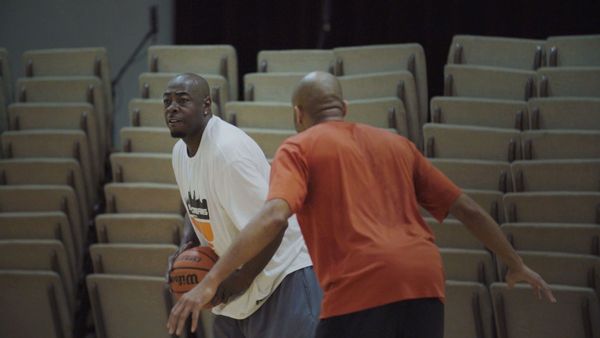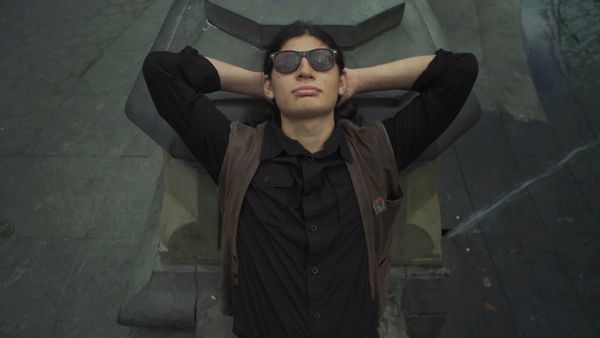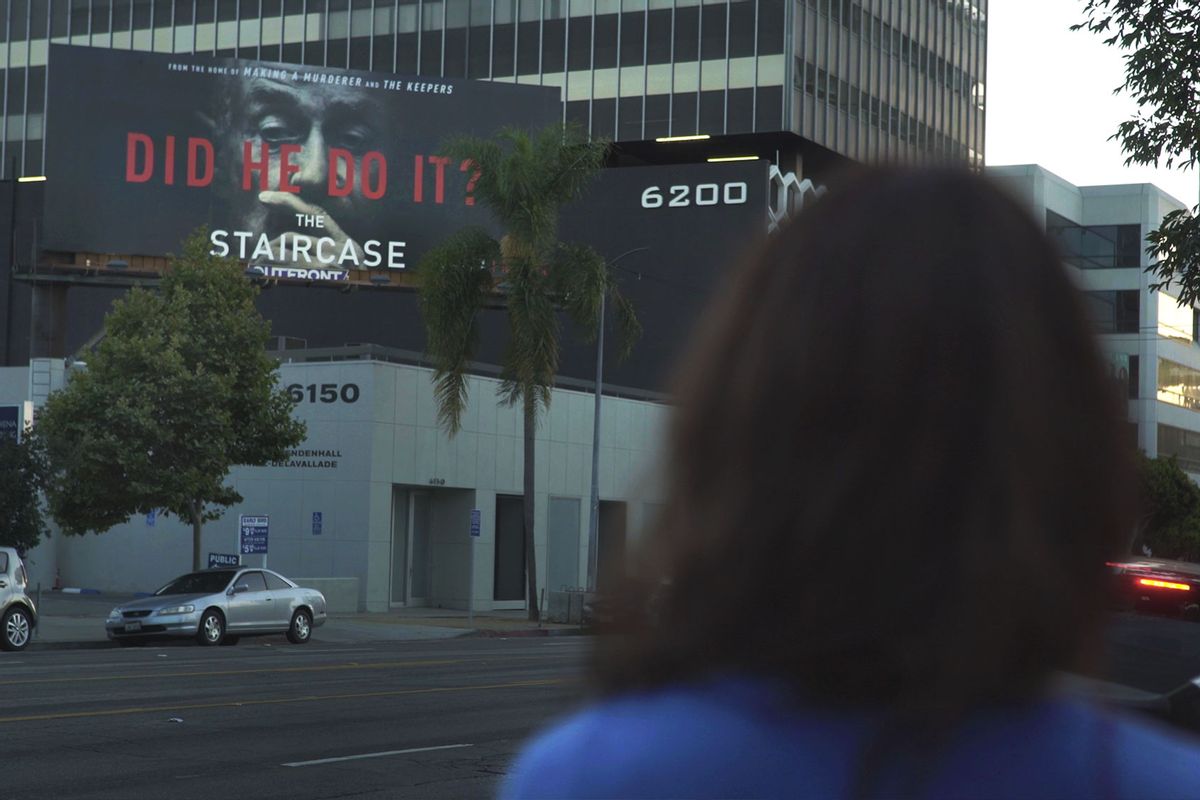What are the responsibilities of a documentary filmmaker to the subject of their film? And why do people participate in documentary films — especially ones that force them to relive their most traumatic experiences? These are two of the many intriguing questions asked in codirector Jennifer Tiexiera and Camilla Hall's fantastic, probing, and compassionate documentary, "Subject," which is having its World Premiere at the Tribeca Film Festival.
The film focuses on five participants whose lives were the basis for influential documentaries and how their lives have been influenced after the cameras stopped rolling.
Margie Ratliff was interviewed for "The Staircase," a documentary about her father being tried for the murder her mother. She describes the experience as, "A huge invasion of privacy." (The story is now the basis for an HBO Max series.) Ahmed Hassan, who appeared in and did cinematography for "The Square," about the Egyptian revolution, talks about the limitations he has faced in the political aftermath of the revolution. Arthur Agee, who was one of the two main participants of "Hoop Dreams," about Black teens hoping to play in the NBA, explains that he reaped some benefits from appearing in the film. Likewise, Mukunda Angulo, one of the participants of "The Wolfpack," about a family homebound by their domineering father, describes how the film helped him get through a difficult period in his life. In contrast, Jesse Friedman, whose life was chronicled in "Capturing the Friedmans," can never escape the film, which recounted him and his father being arrested and imprisoned for sexually abusing young boys.
RELATED: "Free Solo" filmmakers recreated Thai soccer team cave rescue: "A massive and chaotic operation"
"I never thought I'd want to be in a documentary again." – Margie Ratliff, "The Staircase"
Tiexiera and Hall do consider the risks and rewards of making highly personal documentaries. In one segment, Bing Liu, director of "Minding the Gap," recounts that in making his documentary, about him and his friends, he became a participant, and filmed a scene of him talking to his mother about the abuse he suffered at the hands of his stepfather. He hoped it would bring them closer, but it became the elephant in the room for them. Such is the impact documentary films can have.
Tiexiera and Hall spoke with Salon about their revealing documentary, "Subject," which is guaranteed to change the way folks watch documentaries.
What was your criteria for the case studies you selected?
Jennifer Tiexiera: Part of this is a love story for our community. It was born out of a place where we had a lot of questions, but with the five case studies, they were films that completely changed our lives. "Hoop Deams" is the reason I make documentaries. "Capturing the Friedmans" was that for Camilla.
Camilla Hall: We came to all these films because they moved us. We came to them from a point of love and admiration and tried to understand them better. We were both thinking about the different experiences we've had with the participants in our films and wondered what it would be like on the other side of that process. We had the title early on; this word "Subject" was so fascinating and intriguing. Out of the blue, we got an email from one of the editors of "The Staircase" and he introduced us to Margie, who wanted to get into documentaries. So, it was very interesting that we had an idea, and the universe just presented itself. We sat down with Margie to talk about the documentary industry as whole, and we said we had this idea for ["Subject"], and we were really interested in this experience. What do you think about it and how would you feel about that? And she was like, "Oh my God! This is amazing. I never thought I'd want to be in a documentary again, but this is something I want to get behind." She gave us her blessing, but there was also the turning point that there was something important to tell here.
Several of the films covered in your documentary deal with trauma or true crime. What observations do you have about why we like documentaries on those topics?
Tiexiera: The obsession with true crime is a temperature where we're at right now in society. With the pandemic and coming out of Trump, it is a way to turn off and make yourself feel better about your own life. I think there is something inherent about documentaries that there is a connection and people are going to open up and reveal traumatic experience. The films we focused on were made over long period of time. Things evolve. Everyone's life has complexities and trauma in it. We were careful to balance "Capturing the Friedmans," and "The Staircase" with the idea of revolution with "The Square" and something like "Hoop Dreams," which is a slice of Americana. There is trauma involved, but it is an uplifting story about hopes and dreams and sports.
Hall: I think the true crime stories come across strongly in the film because there is this realization that this could have been me. I could have come home from college and found myself as a passive participant [as Margie did in "The Staircase.] It's a very relatable situation. A lot of true crime you feel like this is another world and this was a moment that could happen to any of us, and what would you do if you found yourself in that situation? The popularity of true crime is something we are interested in. I wonder what does it mean when you consume it? Our film says these are just people.
"What we discovered through making 'Subject' is the need for an advocate who can protect and support the participant that isn't the director or producer. "
You explore the gray moral space between what a filmmaker needs and what a participant needs. I love the point about having intimacy coordinators for a sex scene, but not having a therapist for a documentary. Can you talk about the filmmaker's responsibility to a participant?
Tiexiera: This film has completely changed [our] everyday interactions with people. I'm working on a sex abuse documentary now, and the interviews are so intense. I can't imagine not having a therapist for not only the crew but the survivors as well. When we brought it up, the network was, "Of course!" We need to get to a place where it becomes a line item. It seems crazy that we are just having this conversation now. It seems like common sense.
Hall: Most people on set have an advocate of some sort. The crews have their union, but the participant doesn't have an advocate outside of the people trying to make the film. There is a conflict of interest inherent in that complicated relationship. What we discovered through making "Subject" is the need for an advocate who can protect and support the participant that isn't the director or producer.
Why do you think people participate in documentaries about their lives? Several participants in "Subject" say, "You can't say no." At least two have learned this lesson and now say, "No." What are the risks involved?
"We need to find the correct power dynamic."
Tiexiera: There are some beautiful lines about how people want to intrinsically tell their stories. We are storytelling beings by nature. I don't think we'll ever put an end to that, but the thing we are asking people to consider — which goes back to the idea of participants having some resource — is what they are possibly be signing up for? Beyond the idea of participants having this resource — because people want to share stories — is understanding contracts. We rewrote all of our releases. They typically have verbiage like "We own Story in perpetuity through the universe," and if you put that to a participant and they don't know or have resources to protect them, that's a small example of that power imbalance, and that is problematic in your storytelling. It's exciting [for a participant] that someone is listening to them and advocating on their behalf. We need to find the correct power dynamic.
 Arthur Agee, participant of "Hoop Dreams" (Photo by Zachary Shield)
Arthur Agee, participant of "Hoop Dreams" (Photo by Zachary Shield)
There is a cogent point raised in "Subject" about who gets to tell whose story? This is specifically addressed in "Hoop Dreams" as three white men document Black lives and it leads to a discussion of decolonization. But there is also the point about access.
Hall: Are we getting equal opportunities? It's not about people telling different type of stories or about different cultures, but if people from those cultures aren't getting those opportunities, then we are just getting this one specific colonial view on this type of storytelling. The playing field is completely off and that's what needs to change. Funding needs to go to more filmmakers of color and away from white filmmakers to correct that imbalance.
Tiexiera: Similarly, it's so competitive for us. There are so few spots, and we are all competing for those spots. When you have gatekeepers making decisions that could be harmful to a group of people or an entire community, they are not only perpetuating those stereotypes, but they are also taking a spot away from someone else. We've seen that happen with our own films. All the energy is put on this film, and that should be on the responsibility of the people in power. They should do their due diligence. We're sacrificing so much on our end. Money is a huge part of that, but there needs to be more of us getting into those positions of power and those decision-making positions. When Brown Girls Doc Mafia started there were 20 of us and it's turned into this incredible force and sisterhood with thousands of members, and we have a seat at the table and at film fests. And that has made a huge difference for us.
 Mukunda Angulo, participant of "The Wolfpack" (Photo by Zachary Shields)"Subject" also addresses the thorny point about whether the participants of documentaries should be paid for participating. There is an argument that they are giving up their time, and that someone is capitalizing off another person's life/story. There is an asymmetrical power relationship, and there is a cost for the participant that the filmmakers don't bear. Thoughts?
Mukunda Angulo, participant of "The Wolfpack" (Photo by Zachary Shields)"Subject" also addresses the thorny point about whether the participants of documentaries should be paid for participating. There is an argument that they are giving up their time, and that someone is capitalizing off another person's life/story. There is an asymmetrical power relationship, and there is a cost for the participant that the filmmakers don't bear. Thoughts?
"For someone like Margie, who took part in 'The Staircase,' to see her life then fictionalized and her life story become a commodity that people will pay for and not include her, I find that problematic."
Tiexiera: We talked at length about this. Our participants are all written into the equity; if this film makes money after we pay back our investors, they will make money as well. When you are spending every day with someone, there is a responsibility to pay for their transportation or childcare, to pay some kind of day rate. It shouldn't cost them anything to provide that partnership with us. I'm obviously being paid to be there as the director, and I am able to pay for my childcare, so why should I not I expect the same for them?
Hall: In the film, we raise questions. We are not trying to be didactic about it. We are still working it out as an industry. What brought attention to this is the rise of the streamers and the commoditization of individual stories. For someone like Margie, who took part in "The Staircase," to see her life then fictionalized and her life story become a commodity that people will pay for and not include her, I find that problematic. It's not about cashing in; it is about other people cashing in. We are in this different world now where these stories have value, so why shouldn't these people share in the value of their own story? They deal with the consequences of all of the trauma. These people are left with the bill.
Tiexiera: There are six-figure payments for "Inventing Anna." There is real money there. A documentary filmmaker is going to make money off the HBO series "The Staircase" but Margie's not? That's not right.
I'm curious about issues of consent and trust. What observations do you have about filmmaker's bias, and what are your thoughts about a participant's approval regarding how they are shown in a film?
Hall: Personally, I do feel that participants should be able to see how they are portrayed in the film. There are some exceptions — investigative journalism going against a government. In our film, we gave our participants, who were coproducers, final say for their sections, and that can be frightening for a filmmaker, but for us, it really strengthened the film. It was not contractual, but something we agreed to collectively and as part of our creative process. It was a huge part of the film becoming what it is, and it benefited the film.
Tiexiera: Again, this is an industry wide conversation as we speak. PBS is looking at their standards and practices, one of them being: you can't show a participant your final product before it goes out in the world. Again, that is mind-blowing to me. You start this partnership based on trust, and it's a collaboration, and you're not going show it to them before it goes on air with everyone seeing it? There are things that we get wrong as filmmakers. Camilla and I saw it on this project. If you don't create that safe space for back and forth, it hurts the film. As Camilla says, it's a place of fear and control going back to that imbalance of power that is not really healthy for the industry. There are always exceptions to rule, but when it comes to the documentaries we focus on in "Subject," there is a responsibility.
What are your thoughts on the ethical consequences of documentaries such as the ones featured in "Subject"? Some of them seemed to have benefitted from their experiences, but others seem to regret participating.
Hall: The people in our film, there is the whole rainbow of experiences. There is so much nuance. We are not trying to broad-brush and say it's terrible or amazing to be in a documentary. The next time you watch a documentary, have a think about that — that this is a real person.
Tiexiera: Yes, it's about being in a documentary, but the end of Jesse [Friedman]'s section sums it up. The film and Jesse's life fused. There is this idea of him being a subject his entire life. There are so many complexities. Where does the film end and where does life begin? It's an impossible question to answer. It is not that being in a film is good or bad, I just think we're in a world where these are the questions we have to tackle in this age of information.
"Subject" provides a real cautionary tale. What are the film's lessons?
Tiexiera: We are in this very unique moment in time where we are a little bit woke and having these tough conversations. "Subject" is one giant awkward conversation. But it has turned into these helpful, long, beautiful, productive conversations. Ultimately, I believe it's a good thing. We are able to make money for our art. That's the dream, right? Let's just hold ourselves accountable while we are doing it.
Hall: We are not perfect filmmakers. We are not here to lecture; we come to this film through our own mistakes and projects we've been involved with. We wanted to learn and understand. We're not preaching. We've seen it all, and that's why we wanted to make this.
More stories to read:



Shares